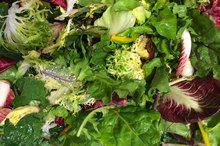Foods That Block Potassium Absorption
Potassium is a mineral found in many foods that aids your body in balancing fluids. It works in conjunction with sodium. Potassium is also responsible for proper muscle contraction and the muscles' resting phase after physical exertion. Levels of this mineral should be kept steady and not drop too low or go too high. Extreme highs or lows of potassium levels can be fatal. Watching your diet carefully is important. Most of our potassium intake comes from our diet and is found in fruits and vegetables. Additives and foods can block our body's absorption of potassium.
High-Sodium Foods
Potassium works with the sodium in your body to keep water retention to a minimum and to keep your body well hydrated. According to the George Mateljan Foundation, most potassium in your body is stored inside your cells while most of the sodium in your body is stored in the fluid that surrounds your cells. Too much sodium can block potassium absorption and raise fluid levels, causing swelling of the body. Salt is the main form of sodium taken in on a daily basis by many people. Canned processed vegetables and fruits also contain high amounts of sodium and should be kept at a minimum or avoided all together. Snack foods, such as chips and cookies, contain loads of sodium and should only be consumed in moderation. Get into the habit of reading labels when grocery shopping to help you determine if the convenience of canned processed foods are worth the risk 2.
- Potassium works with the sodium in your body to keep water retention to a minimum and to keep your body well hydrated.
Caffeine
How Much Potassium Does a Female Need?
Learn More
Caffeine can be found in teas, colas, coffee and candy. Consuming these items in large quantities can cause your potassium levels to drop. Caffeine inhibits absorption of potassium by "clogging" the kidneys and liver. Your liver is responsible for releasing potassium into your bloodstream after it has filtered it. Your liver can be seen as a large filter that strains bad bacteria from the good minerals that your body needs. Bad bacteria goes to waste; good minerals get distributed equally. If you take in large amounts of caffeine, you are clogging the filter. The good minerals cannot get through, causing deficiencies.
- Caffeine can be found in teas, colas, coffee and candy.
- Your liver can be seen as a large filter that strains bad bacteria from the good minerals that your body needs.
Alcohol
Drinking alcohol in excess thins your blood and causes dilution of the potassium in your bloodstream. Alcohol also dehydrates the body and blocks absorption of potassium. Again, you must consider the liver because alcohol has direct effects on this organ. Excessive drinking can cause strain on the liver increasing the risk for disease, such as cirrhosis of the liver. When strain is put on your liver, its function slows tremendously. Your body will not get steady amounts of the minerals it needs to survive. Slowing the liver can also cause immune system sluggishness, which can cause sickness, further harming potassium levels in the bloodstream.
- Drinking alcohol in excess thins your blood and causes dilution of the potassium in your bloodstream.
- Again, you must consider the liver because alcohol has direct effects on this organ.
Related Articles
References
- Explore Vitamins
- The World's Healthiest Foods
- Aburto, et. al. Effect of increased potassium intake on cardiovascular risk factors and disease: systematic review and meta-analyses. BMJ. 2013 Apr 3;346:f1378. DOI: 10.1136/bmj.f1378.
- Appel LJ, Moore TJ, Obarzanek E, et al. A clinical trial of the effects of dietary patterns on blood pressure. DASH Collaborative Research Group. N Engl J Med. 1997;336(16):1117-1124.
- Ferraro PM, et. al. Dietary Protein and Potassium, Diet–Dependent Net Acid Load, and Risk of Incident Kidney Stones. CJASN. October 2016, 11 (10) 1834-1844; DOI: 10.2215/CJN.01520216
- Granchi, D, et. al. Potassium Citrate Supplementation Decreases the Biochemical Markers of Bone Loss in a Group of Osteopenic Women: The Results of a Randomized, Double-Blind, Placebo-Controlled Pilot Study. Nutrients. 2018 Sep 12;10(9). pii: E1293. DOI: 10.3390/nu10091293.
- Linus Pauling Institute. Potassium.
- Macdonald, HM, et. al. Effect of potassium citrate supplementation or increased fruit and vegetable intake on bone metabolism in healthy postmenopausal women: a randomized controlled trial. Am J Clin Nutr. 2008 Aug;88(2):465-74.
- National Institute of Health. Office of Dietary Supplements. Potassium.
Writer Bio
Sharin Griffin has been a freelance writer since 2009, specializing in health-related articles. She has worked in the health-care industry as a certified nursing assistant and medical technician. Griffin's medical expertise encompasses bariatrics and geriatric care, with an emphasis on general medicine. She is completing an associate degree in health-care administration from Axia University.









